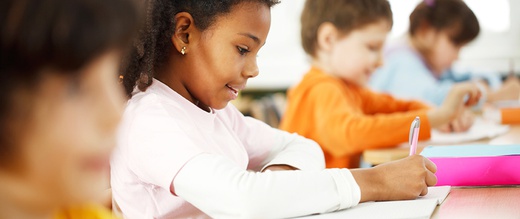The views expressed in our content reflect individual perspectives and do not represent the authoritative views of the Baha'i Faith.
“School days, school days, dear old Golden Rule days…”
That 1907 tune comes to mind each time a new school year begins. It suggests, in addition to “reading, ‘riting and ’rithmetic,” that good manners and morals once represented an integral part of the curriculum. Because this was often “taught to the tune of a hick’ry stick,” those rules regulating children’s behavior have often faded away. But we’ve now swung too far in the opposite direction, which has created devastating results in the classroom.
We’ve gone from doling out corporal punishment to teachers being subject to lawsuits for punishing a student who breaks the rules. Some teachers complain that so much time is spent dealing with behavioral issues they can barely teach. They feel more like policemen than instructors.
This pendulum swing also affects positive reinforcement. In some places, teachers can no longer hold or hug a child who needs to be consoled–and even have to keep hands off when congratulating a student for their successes.
The Baha’i teachings tell us to:
Regard man as a mine rich in gems of inestimable value. Education can, alone, cause it to reveal its treasures, and enable mankind to benefit therefrom. – Baha’u’llah, Gleanings from the Writings of Baha’u’llah, p. 260.
These treasures—our children—need more than just material education. If we don’t include moral training in school curricula, education can harm rather than help.
Abdu’l-Baha explained:
Training in morals and good conduct is far more important than book learning. A child that is cleanly, agreeable, of good character, well-behaved—even though he be ignorant—is preferable to a child that is rude, unwashed, ill-natured, and yet becoming deeply versed in all the sciences and arts. The reason for this is that the child who conducts himself well, even though he be ignorant, is of benefit to others, while an ill-natured, ill-behaved child is corrupted and harmful to others, even though he be learned. If, however, the child be trained to be both learned and good, the result is light upon light. – Selections from the Writings of Abdu’l-Baha, p. 135.
Those who don’t have ethics and virtues instilled in them, rather than being immersed in the light of good character, will likely use their learning for negative rather than beneficial purposes.
In his book Renewing the Sacred: A New Vision of Education, author/educator William Barnes says:
…as pre-scientific religion sealed off the objective lower world of Nature from investigation, so, too, secular knowledge seals off the higher world of spirit. – p. 48
Further he asserts, “…secular understanding is human knowledge that has been stripped of the sacred dimension.”- p. 48
What’s the source of good conduct, of moral and ethical behavior? Religion. Yet Barnes doesn’t promote adding sectarian religious teaching to the schools. Instead, he suggests a return to spirituality as the basis for education. He argues:
The separation of church and state cannot also mean the separation of spiritual and moral values from everyday life. The changes in consciousness and society of the past few hundred years have made sacred knowledge more critical rather than less critical than ever to know and use. – p. 61
He states:
Moral training should enable students to harmonize conflicting forces in themselves and their environment… – p. 179
Barnes goes on to say that:
Teachers of spiritual education are stewards of those core values and principles which should also be the backbone of culture and society, of every organization and community…. Good values are absolutely essential to all forms and sizes of human community: community is only built and held together by virtues. – p. 189
Abdu’l-Baha tells us:
Every child is potentially the light of the world — and at the same time its darkness; wherefore must the question of education be accounted as of primary importance. From his infancy, the child must be nursed at the breast of God’s love, and nurtured in the embrace of His knowledge, that he may radiate light, grow in spirituality, be filled with wisdom and learning, and take on the characteristics of the angelic host. – Selections from the Writings of Abdu’l-Baha, pp. 130-131.
Around the world, many schools have reached these same conclusions. They’ve incorporated spiritually-grounded, values-based learning programs like Character Counts (www.charactercounts.org), The Virtues Project (www.virtuesproject.com) and Full-Circle Learning (www.fullcirclelearning.org) into their curriculum, teaching their students universal values through humanitarian service learning. Programs like these actually guide children, in fun, positive and creative ways, to respect the rights and feelings of others; and to begin to see themselves as the helpers, healers and change agents of their own communities—and of the planet. May this heartening trend spread, expand, and become the norm rather than the exception. Our children will soon become the future. Let’s make sure they also become “light upon light.”

















Comments
Sign in or create an account
Continue with Facebookor